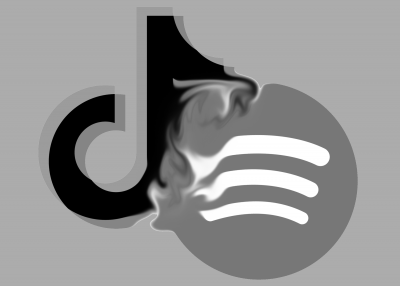Before the advent of streaming, no monthly revenue existed for musicians. Spotify indelibly changed this, offering a royalties system — where each stream of your song earns you money.
Unfortunately, the amount earned by each stream is a fraction of a penny, meaning unless one has a massive fanbase, like Drake or Bad Bunny who currently rank as the site’s top two streamed artists — earning a livable wage from streaming is impossible.
Suddenly the newfangled system, once thought to be the industry’s hail mary, feels like placing a band aid atop a broken dam.
An obvious resolution to providing indie artists the profits they deserve is upping Spotify’s monthly subscription fee, but the disrespect of music from TikTok, combined with the uber-accessible facet of streaming, have made it even more likely that such an increase would serve as a dealbreaker for listeners.
TikTok’s inconceivable influence on the music industry has altered how Gen Z perceives music. The eighth note app, known for its short form content and endless scroll, has begun to act as a major player in making or breaking up and coming artists.

One of the most recent recipients of the TikTok fast track to stardom was Gayle — known for the hit song “abcdefu,” in which the singer wields a play on the purposefully mis-sequenced letters of the alphabet to tell her imagined ex to f— off.
Pop is easy to get people to catch on to, that’s the whole point — it’s the Marvel Cinematic Universe of music, but Gayle’s “abcdefu” goes a step further.
The hit is everything a TikTok song should be — catchy, inoffensive, and it presents a clear story so users know what to do with it. While meaningful music may be near and dear to our hearts, no TikToker wants to decipher code when planning a video to go along with a popular song.
Though there’s no way of knowing for sure, it almost seems as if Gayle — and other writers of TikTok songs where the singer rants about a basic human experience with as much snappy repetition as possible — especially write their music to take off on the app. Thereby molding their “art” to be well received rather than making something and hoping it fits.
Music should come from a soulful place. The origins of music stem from the human need for connection. Darwin theorized it was a method of mating call, while others believe it was a way to weave people together, fostering a more close-knit sense of community.
When you listen to a song, whether you’re indulging in nostalgia with China Anne McClain’s “Calling All The Monsters” for the Halloween season or desperate for evidence you’re not alone in feeling alone with Mitski’s “Nobody” — music provides an opportunity to feel.
TikTok, beyond making Harry Styles’s discography interminably overplayed, sucks the emotion out of music in a plethora of ways. The “slowed and reverb” or “sped up” version of a song disregards the time and consideration an artist puts into their music. The 10 second snippets songs are forced into, can rearrange the intended meaning of a song entirely, while also making the art of the album even more obsolete than the practice of attempting to chart with singles already has.
TikTok music isn’t art, it’s content. Beyond the aforementioned disrespect TikTok has fostered for music, the accessibility of music itself has ironically made it easier to tune out.
Unlike decades ago when you had to go out of your way, not only to buy a device like a record or CD player, but the records and CDs themselves — music now rests at the tips of our fingers. We scroll for hours, hearing an endless amount of song clippets, and then, just to top it off, jump on Spotify and play a nine hour playlist to lull us to sleep. Music is right there all the time, and because of that it’s lost its impact.
TikTok is fun, and music should be too. The ability for as many people to access music for as cheap as possible isn’t a bad thing. This is not to sound like an angry grandfather shaking his fists to the flock, but instead to encourage music enjoyers everywhere (of which we all are), to stop and smell the metaphorical roses.
Rather than taking advantage of our open entrance to music, we should go out of our way to recognize musicians who have the heart but lack the funds.
If possible, ABCDEF-you should be as willing to dedicate a bit more money each month to Spotify as you are to Netflix and Hulu. It will serve artists in the long run and save us from an apocalyptic future of nursing rhyme pop hits.
This editorial was written by Opinion Editor Lydia Evans.




